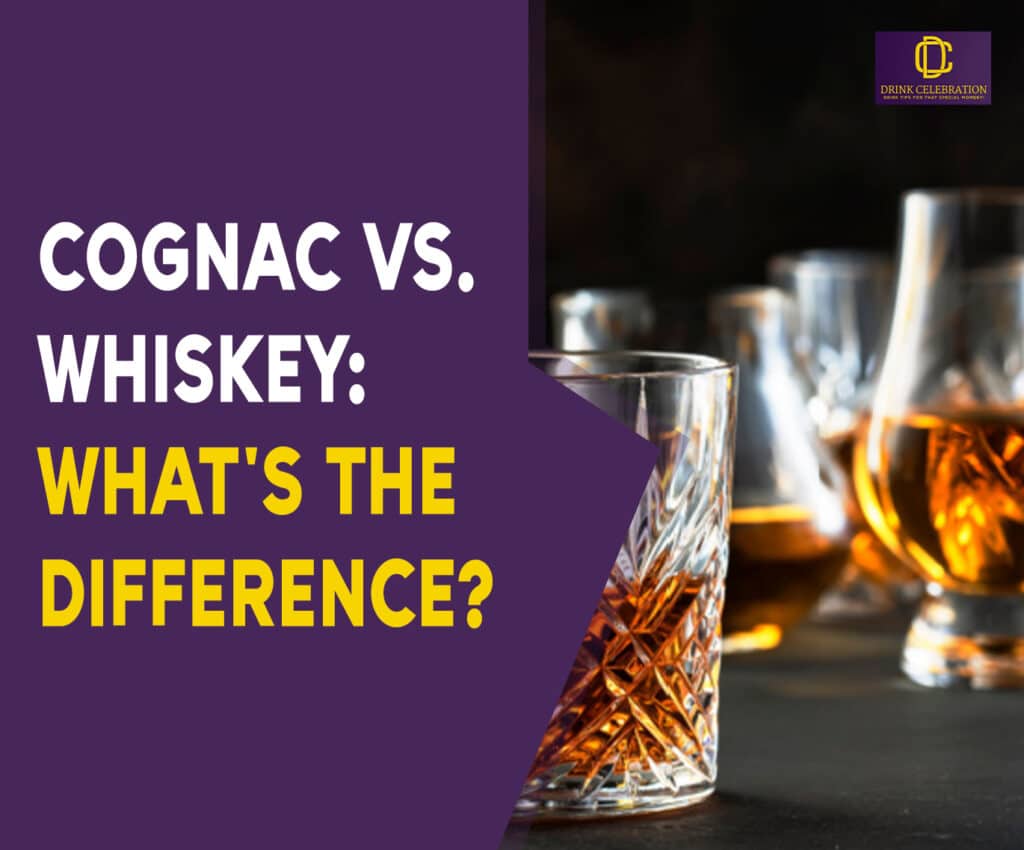Cognac and whiskey are exceptional drinks, and they have an all-inclusive history. A significant amount of people are committed to these two drinks, and even though they’re both exquisite drinks loved by most spirit enthusiasts, they vary in their ingredients and in the manufacturing process.
In this article, we will explore the similarities of these two drinks. The basis will be the conventional uses of the drinks. We will contrast these two drinks by comparing where each is from and the entire manufacturing process.

The Differences Between Cognac and Whiskey
| Cognac | Whiskey |
|---|---|
| Cognac is solely made from white wine grapes. | Conversely, whiskey is made from various grains like rye, corn, and wheat. |
| Cognac undergoes the aging process for two years. | On the other hand, whiskey takes at least three years to age. However, it depends on the country’s climate from which the whiskey is produced. |
| Cognac is manufactured in France. | Whiskey can be manufactured or produced in any place in the world. |
| Cognac is compatible with wine. | Whiskey is compatible with beer. |
| Cognac has a fruity, rich aroma. | Whiskey has various aromas. |
| Cognac has a velvety, smooth taste. | Whiskey has various tastes because it depends on how it’s produced. |

Cognac is solely made from white wine grapes. On the other hand, whisky is made from various grains such as:
- Wheat
- Rye
- Corn and other ingredients
For malt scotch whisky, the grain leveraged must be the malted barley, and whisky is like a cousin beer of cognac.
The huge distinction between these two drinks is the ingredients used in both. To manufacture cognac, you must go through the entire growing and reaping of the grapes. Afterward, the crucial steps of cognac production take place at the winery. In the winery, there is the fermentation of the approved grapes. After that, the fermented grapes undergo the process of distillation, aging, and blending.
Unlike cognac, to produce whiskey, you have to start with malting. Malting is a process that entails germinating barley. After this, the mashing process draws out the sugar in the barley. After that, it’s fermentation, distillation, and aging. After the fermentation and distillation process, the finished product is kept in oak to age. In the oak, it takes on the colors, interesting flavors, and complexity.
Cognac is distilled twice in the copper pot stills, then aged for at least two years in French oak barrels. Unlike cognac, the distilling of whisky depends on the regional style. So, based on this, whisky can undergo the distilling process in column stills or pot stills.
The time whisky takes to mature varies enormously with the regional style. The climate of the countries where the whisky is made determines the maturity time. Scotch whisky must undergo aging in oak barrels and should stay there for at least three years.
Regionality and Sub-categories
One outstanding, unique trait of cognac is its regionality. Cognac is a region in France, and it’s in the Charente department, found in the Southwest of France. This legendary brandy is only manufactured in France, and the more thrilling part is that it has been manufactured in France for hundreds of years.
In contrast to cognac, the production or manufacturing of whiskey can occur from anywhere on Earth, such as in Japan, Canada, or even beyond.
In the expanding whiskey world, there are many types or sub-categories of whisky. They are all made in a specific place and a particular way.
Some of the main sub-categories of whiskey are:
- Bourbon
- Rye
- Irish whiskey
- Scotch whiskey
- Japanese whiskey
On the other hand, cognac is a sub-category. Nevertheless, it’s among the significant types of brandies, and they’re all set in Europe. Besides the cognac brandy, Armagnac is also manufactured in a certain reserve in France and the Lourinha of Portugal.
Flavor Variations
Another thing that brings the distinction between cognac and whiskey is the flavor variations. Cognac is more compatible with wine, while whiskey is more like beer. You can see the difference between these two drinks by not only their production process and regionality but also by how they taste.
Cognac provides so much in the way of fruitiness, and it has added ingredients from barrel aging. However, you can detect floral characteristics, stone fruit, spice, and citrus. Cognac is a concentrated type of wine, so it has a lot of tannins at play. The tannins make cognac to provide a structure and an indigenous, adhesive sensation on the palate.
Whisky shares some of the above cognac-tasting notes, and the ryes and the lighter bourbons have some cognac-tasting notes. However, whisky displays fewer fruits widely, and it’s more in the way of malt, toffee, and vanilla.
Additionally, because of the whisky’s grain base, you’ll likely get cereal-like flavors and hints of nuts, herbs, and honey. So many types of whisky make it have a wide flavor scope.
When drinking cognac, it’s less probable that you’ll come across so much smokiness. However, for Scotch whiskey, or any type of whisky, you’re guaranteed to come across the smokiness. This is because of whiskeys ingredients and the production processes.
When you pour whiskey and cognac into different glasses, you’ll notice the two look a bit similar. However, most of the time, whiskey is a bit more brown or amber. Cognac, on the other hand, can sometimes take on yellowish or reddish tones.
Smell and Taste
Fresh wine enthusiasts find the taste of cognac similar to wine taste. Cognac has a fruity, rich aroma with dried fruits like prunes and raisin notes. Cognac also has floral undertones; sometimes, it has a touch of oak or spice because of aging.
On the other hand, whiskey has an array of aromas. The aroma whiskey produces depends on which type it is. Scotch, rye, and bourbon have different smells or aromas. Whiskey features malt, and corn, sometimes combined with caramel or vanilla components.
When it comes to taste, cognac has a velvety, smooth taste and a balanced sweetness. However, the taste of cognac is sometimes complex, and it evolves as it remains on the palate. On the other hand, whiskey has various tastes because it depends on how it was produced.
Similar Whiskey Comparisons
We compared whiskey with other similar drinks:
Conclusion
Even though cognac and whiskey are similar, we can see in the article how they differ based on flavors, production methods, smell and taste, and their regionality. Cognac is manufactured in France.
On the other hand, the manufacturing or production of whiskey can be done anywhere in the world. So, if you’re wondering about the best drink, you can review the article. With the article, you’ll be able to choose what you prefer.